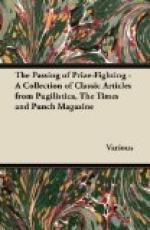As no eloquence could be adequate to such a theme—not even that of PERICLES or LINCOLN, as Mr. ASQUITH tactfully remarked—fewer and briefer speeches might have sufficed. The PRIME MINISTER painted the lily a little thickly, though no one would have had him omit his picturesque narrative of the first battle of Ypres—I hope some of its few survivors were among the soldiers in the Gallery—or his tributes to the Navy and the Merchant Service. Nor did one grudge Mr. REDMOND’S paean in praise of the Irish troops. It’s not his fault, at any rate, that there aren’t more of them.
Seen at its best in the afternoon, the House descended to the depths on the adjournment, when Mr. PONSONBY, Mr. RAMSAY MACDONALD and Mr. KING badgered the HOME SECRETARY for the best part of an hour because in the exercise of his duty he had had some of their friends’ correspondence opened and read. In ordinary times Members are very jealous, and rightly so, of this official espionage. The case of Sir JAMES GRAHAM and MAZZINI’S letters was raked up and quoted for all it was worth—and a little more; for, as Sir GEORGE CAVE reminded us, even on that occasion a Select Committee supported the action of the Government. The fact is that, when you are fighting for freedom en gros, individual liberties must of necessity be curtailed. Knowing that our letters in war-time are liable to inspection, the wise among us stick to postcards. As Mr. PONSONBY assures us that he and his friends have nothing to conceal, let them do likewise.
One missed Mr. SNOWDEN, usually to the fore on these occasions. An incident earlier in the afternoon perhaps accounted for his absence. By way of bolstering up a charge of harshness against the HOME SECRETARY he mentioned that a deported German had “a son serving in the British Army.” The Minister frankly admitted it. “The son,” he said, “a British subject, who endeavoured to avoid military service, was arrested, and is serving in a noncombatant unit.” Exit Mr. SNOWDEN.
Tuesday. October 30th. I strongly suspect Major NEWMAN and Mr. REDDY of collaborating, like the “Two Macs” of music-hall fame. No other theory will explain the gallant Major’s well-feigned annoyance at what he called “the assumption of military rank by clergymen and members of the theatrical profession” connected with cadet-corps. Mr. MACPHERSON supplied the official answer, namely, that gentlemen holding cadet-commissions are entitled to wear service dress; but the real object of the question was revealed when Brother REDDY from the backbenches piped out, “Does that apply to sham officers wearing uniform in this House?” There was a roar of laughter, and Major NEWMAN blushed his appreciation.
I can imagine no more hopeless task than to plead the cause of Bulgaria in present circumstances; yet Mr. NOEL BUXTON cheerfully essays it whenever he gets an opportunity. This time he attempted to read into a recent utterance of the FOREIGN SECRETARY agreement with his own views.




